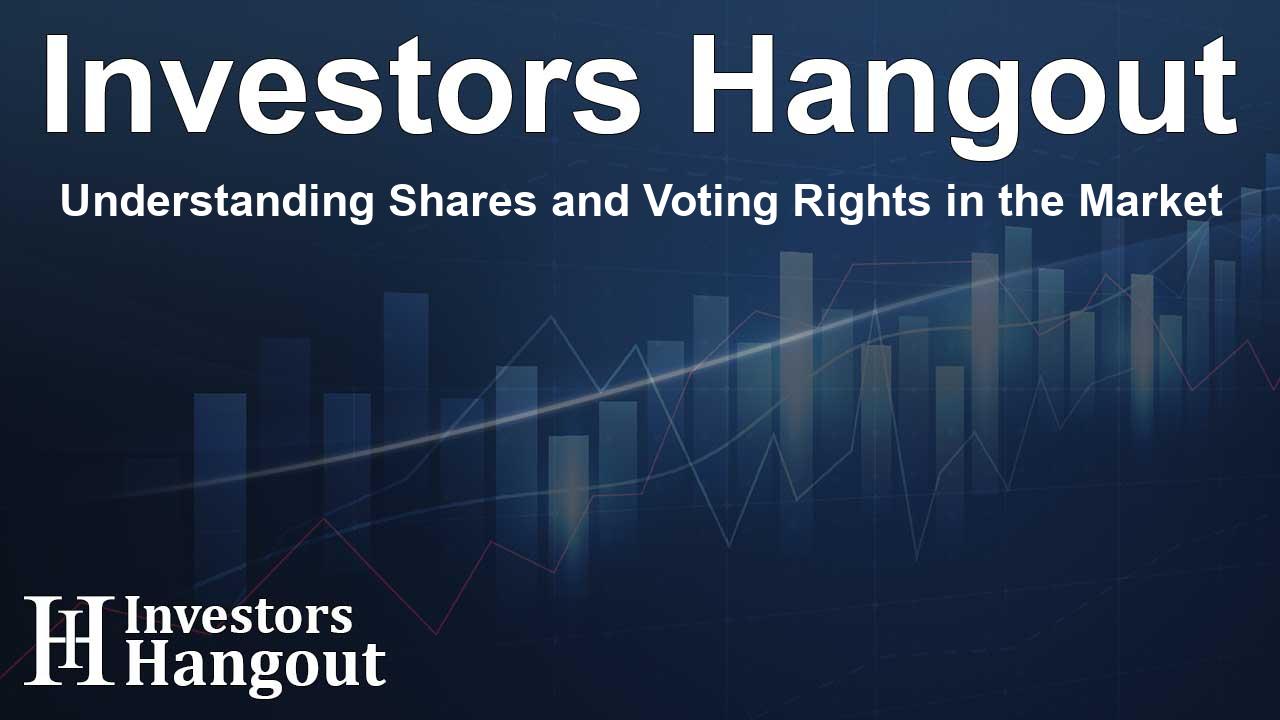Understanding Shares and Voting Rights in the Market

Exploring Total Shares and Voting Rights
In the world of finance, understanding the total number of shares and associated voting rights is crucial for investors. This informs decision-making processes and reflects the health of a company's governance. With the rise of shareholder activism, transparency regarding shares and voting rights has become a priority for companies in the market.
Key Insights About Voting Rights
The basis of voting rights typically involves shareholders possessing rights proportional to their share ownership. In many frameworks, like that in France, a double voting right is conferred upon fully paid-up shares. This change occurred on April 3, 2016, concerning shares held for at least two years in a registered format, encouraging long-term investment strategies.
Details on Shares Management
The management of shares and their voting rights is not merely administrative; it reflects the guiding strategies of an organization. The total number of issued shares can determine the balance of power between different classes of shareholders. For instance, if a company has 2.66 billion shares, understanding how these shares are distributed and which are treasury shares is vital in determining actual voting rights.
Recent Trends and Changes
As investors look for transparency, monitoring changes in the number of shares and the breakdown of treasury shares becomes essential. For example, as of the end of August 2025, total shares reported were 2,660,056,599 with a noted decrease in treasury shares, reflecting potential repurchase strategies or shifts in shareholder composition.
Examining the Impact of Treasury Shares
Treasury shares, or shares that have been repurchased by the company, do not typically confer voting rights. This means that as a company buys back shares, it might reduce the voting power among public shareholders. Understanding how many treasury shares are held, such as the reported 1,504,348, can give insight into a company's strategy for enhancing shareholder value, whether through improved earnings per share or influencing corporate governance.
Understanding Voting Rights Calculations
Voting rights are often calculated considering all shares to which they are attached, including those shares that may not have voting rights under specific circumstances. For investors and analysts, calculating theoretical voting rights provides a clearer picture of a company's governance structure and can impact shareholder actions during meetings and decisions.
Conclusion: The Bigger Picture
The relationship between total shares issued and voting rights extends beyond simple numbers. It reflects a company's strategic vision and the engagement level of its shareholders. As the market evolves, continuing to track these metrics will be paramount for investors looking to maximize their influence and align their investments with their financial goals.
Frequently Asked Questions
What are voting rights in relation to shares?
Voting rights grant shareholders the ability to influence corporate decisions, typically proportional to their ownership stake.
Why do companies buy back shares?
Companies may buy back shares to reduce the number of shares outstanding, potentially enhance earnings per share, and consolidate ownership.
How are treasury shares different from other shares?
Treasury shares are shares that a company has repurchased and are not available to the public, resulting in no voting rights.
What is the significance of double voting rights?
Double voting rights incentivize long-term ownership by granting additional voting powers to shareholders who retain their shares for a specified duration.
How can I find out more about a company's shares and voting rights?
Most companies provide this information in their annual reports or investor relations sections, allowing investors to make informed decisions.
About The Author
Contact Addison Perry privately here. Or send an email with ATTN: Addison Perry as the subject to contact@investorshangout.com.
About Investors Hangout
Investors Hangout is a leading online stock forum for financial discussion and learning, offering a wide range of free tools and resources. It draws in traders of all levels, who exchange market knowledge, investigate trading tactics, and keep an eye on industry developments in real time. Featuring financial articles, stock message boards, quotes, charts, company profiles, and live news updates. Through cooperative learning and a wealth of informational resources, it helps users from novices creating their first portfolios to experts honing their techniques. Join Investors Hangout today: https://investorshangout.com/
The content of this article is based on factual, publicly available information and does not represent legal, financial, or investment advice. Investors Hangout does not offer financial advice, and the author is not a licensed financial advisor. Consult a qualified advisor before making any financial or investment decisions based on this article. This article should not be considered advice to purchase, sell, or hold any securities or other investments. If any of the material provided here is inaccurate, please contact us for corrections.
